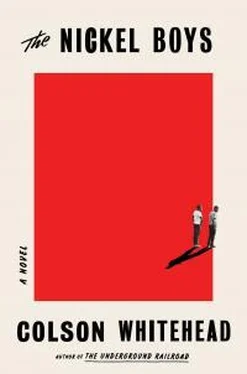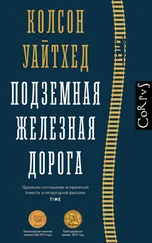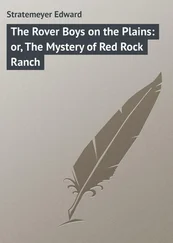Колсон Уайтхед - The Nickel Boys
Здесь есть возможность читать онлайн «Колсон Уайтхед - The Nickel Boys» весь текст электронной книги совершенно бесплатно (целиком полную версию без сокращений). В некоторых случаях можно слушать аудио, скачать через торрент в формате fb2 и присутствует краткое содержание. Год выпуска: 2019, Издательство: Penguin Random House LLC, Жанр: roman, на английском языке. Описание произведения, (предисловие) а так же отзывы посетителей доступны на портале библиотеки ЛибКат.
- Название:The Nickel Boys
- Автор:
- Издательство:Penguin Random House LLC
- Жанр:
- Год:2019
- ISBN:нет данных
- Рейтинг книги:4 / 5. Голосов: 1
-
Избранное:Добавить в избранное
- Отзывы:
-
Ваша оценка:
- 80
- 1
- 2
- 3
- 4
- 5
The Nickel Boys: краткое содержание, описание и аннотация
Предлагаем к чтению аннотацию, описание, краткое содержание или предисловие (зависит от того, что написал сам автор книги «The Nickel Boys»). Если вы не нашли необходимую информацию о книге — напишите в комментариях, мы постараемся отыскать её.
), that the world began to care.
The Nickel Boys — читать онлайн бесплатно полную книгу (весь текст) целиком
Ниже представлен текст книги, разбитый по страницам. Система сохранения места последней прочитанной страницы, позволяет с удобством читать онлайн бесплатно книгу «The Nickel Boys», без необходимости каждый раз заново искать на чём Вы остановились. Поставьте закладку, и сможете в любой момент перейти на страницу, на которой закончили чтение.
Интервал:
Закладка:
Big John Hardy, a retired carpet salesman from Omaha, maintained a website for the Nickel Boys with the latest news. He kept the others apprised on the petition for another investigation and how the statement of apology from the government was coming along. A blinking digital widget kept track of the fund-raising for the proposed memorial. E-mail Big John the story of your Nickel days and he’d post it with your picture. Sharing a link with your family was a way of saying, This is where I was made. An explanation and an apology.
The annual reunion, now in its fifth year, was strange and necessary. The boys were old men now, with wives and ex-wives and children they did or didn’t talk to, with wary grandchildren who were brought around sometimes and those whom they were prevented from seeing. They had managed to scrape up a life after leaving Nickel or had never fit in at all with normal people. The last smokers of cigarette brands you never see, late to the self-help regimens, always on the verge of disappearing. Dead in prison, or decomposing in rooms they rented by the week, frozen to death in the woods after drinking turpentine. The men met in the conference room of the Eleanor Garden Inn to catch up before caravaning out to Nickel for the solemn tour. Some years you felt strong enough to head down that concrete walkway, knowing that it led to one of your bad places, and some years you didn’t. Avoid a building or stare it in the face, depending on your reserves that morning. Big John posted a report after each reunion for those who couldn’t make it.
In New York City there lived a Nickel Boy who went by the name of Elwood Curtis. He’d do a web search on the old reform school now and then, see if there were any developments, but he stayed away from the reunions and didn’t add his name to the lists, for many reasons. What was the point? Grown men. What, you take turns handing each other Kleenex? One of the others posted a story about the night he parked outside Spencer’s house, watching the windows for hours, the silhouette figures inside, until he talked himself out of revenge. He’d made his own leather strap to use on the superintendent. Elwood didn’t get it. Go all that way, might as well follow through.
When they found the secret graveyard, he knew he’d have to return. The clutch of cedars over the TV reporter’s shoulder brought back the heat on his skin, the screech of the dry flies. It wasn’t far off at all. Never will be.
PARTOne
CHAPTER ONE
Elwood received the best gift of his life on Christmas Day 1962, even if the ideas it put in his head were his undoing. Martin Luther King at Zion Hill was the only album he owned and it never left the turntable. His grandmother Harriet had a few gospel records, which she only played when the world discovered a new mean way to work on her, and Elwood wasn’t allowed to listen to the Motown groups or popular songs like that on account of their licentious nature. The rest of his presents that year were clothes—a new red sweater, socks—and he certainly wore those out, but nothing endured such good and constant use as the record. Every scratch and pop it gathered over the months was a mark of his enlightenment, tracking each time he entered into a new understanding of the reverend’s words. The crackle of truth.
They didn’t have a TV set but Dr. King’s speeches were such a vivid chronicle—containing all that the Negro had been and all that he would be—that the record was almost as good as television. Maybe even better, grander, like the towering screen at the Davis Drive-In, which he’d been to twice. Elwood saw it all: Africans persecuted by the white sin of slavery, Negroes humiliated and kept low by segregation, and that luminous image to come, when all those places closed to his race were opened.
The speeches had been recorded all over, Detroit and Charlotte and Montgomery, connecting Elwood to the rights struggle across the country. One speech even made him feel like a member of the King family. Every kid had heard of Fun Town, been there or envied someone who had. In the third cut on side A, Dr. King spoke of how his daughter longed to visit the amusement park on Stewart Avenue in Atlanta. Yolanda begged her parents whenever she spotted the big sign from the expressway or the commercials came on TV. Dr. King had to tell her in his low, sad rumble about the segregation system that kept colored boys and girls on the other side of the fence. Explain the misguided thinking of some whites—not all whites, but enough whites—that gave it force and meaning. He counseled his daughter to resist the lure of hatred and bitterness and assured her that “Even though you can’t go to Fun Town, I want you to know that you are as good as anybody who goes into Fun Town.”
That was Elwood—as good as anyone. Two hundred and thirty miles south of Atlanta, in Tallahassee. Sometimes he saw a Fun Town commercial while visiting his cousins in Georgia. Lurching rides and happy music, chipper white kids lining up for the Wild Mouse Roller Coaster, Dick’s Mini Golf. Strap into the Atomic Rocket for a trip to the moon. A perfect report card guaranteed free admission, the commercials said, if your teacher stamped a red mark on it. Elwood got all A’s and kept his stack of evidence for the day they opened Fun Town to all God’s children, as Dr. King promised. “I’ll get in free every day for a month, easy,” he told his grandmother, lying on the front-room rug and tracing a threadbare patch with his thumb.
His grandmother Harriet had rescued the rug from the alley behind the Richmond Hotel after the last renovation. The bureau in her room, the tiny table next to Elwood’s bed, and three lamps were also Richmond castoffs. Harriet had worked at the hotel since she was fourteen, when she had joined her mother on the cleaning staff. Once Elwood entered high school, the hotel manager Mr. Parker made it clear he’d hire him as a porter whenever he wanted, smart kid like him, and the white man was disappointed when the boy began working at Marconi’s Tobacco & Cigars. Mr. Parker was always kind to the family, even after he had to fire Elwood’s mother for stealing.
Elwood liked the Richmond and he liked Mr. Parker, but adding a fourth generation to the hotel’s accounts made him uneasy in a way he found difficult to describe. Even before the encyclopedias. When he was younger, he sat on a crate in the hotel kitchen after school, reading comic books and Hardy Boys while his grandmother straightened and scrubbed upstairs. With both his parents gone, she preferred to have her nine-year-old grandson nearby instead of alone in the house. Seeing Elwood with the kitchen men made her think those afternoons were a kind of school in their own right, that it was good for him to be around men. The cooks and waiters took the boy for a mascot, playing hide-and-seek with him and peddling creaky wisdom on various topics: the white man’s ways, how to treat a good-time gal, strategies for hiding money around the house. Elwood didn’t understand what the older men talked about most of the time, but he nodded gamely before returning to his adventure stories.
After rushes, Elwood sometimes challenged the dishwashers to plate-drying races and they made a good-natured show of being disappointed by his superior skills. They liked seeing his smile and his odd delight at each win. Then the staff turned over. The new downtown hotels poached personnel, cooks came and went, a few of the waiters didn’t return after the kitchen reopened from flood damage. With the change in staff, Elwood’s races changed from endearing novelty to mean-spirited hustle; the latest dishwashers were tipped off that the grandson of one of the cleaning girls did your work for you if you told him it was a game, keep on the lookout. Who was this serious boy who loitered around while the rest of them busted their asses, getting little pats on the head from Mr. Parker like he was a damn puppy, nose in a comic book like he hadn’t a care? The new men in the kitchen had different kinds of lessons to impart to a young mind. Stuff they’d learned about the world. Elwood remained unaware that the premise of the competition had changed. When he issued a challenge, everybody in the kitchen tried not to smirk.
Читать дальшеИнтервал:
Закладка:
Похожие книги на «The Nickel Boys»
Представляем Вашему вниманию похожие книги на «The Nickel Boys» списком для выбора. Мы отобрали схожую по названию и смыслу литературу в надежде предоставить читателям больше вариантов отыскать новые, интересные, ещё непрочитанные произведения.
Обсуждение, отзывы о книге «The Nickel Boys» и просто собственные мнения читателей. Оставьте ваши комментарии, напишите, что Вы думаете о произведении, его смысле или главных героях. Укажите что конкретно понравилось, а что нет, и почему Вы так считаете.

![Колсон Уайтхед - Подземная железная дорога [litres]](/books/411182/kolson-uajthed-podzemnaya-zheleznaya-doroga-litres-thumb.webp)










